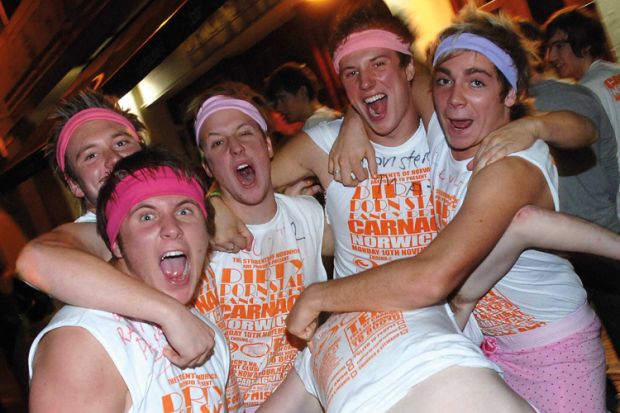Universities are not doing enough to tackle a widespread “lad culture” of excessive drinking and lewd behaviour on campus, the sector’s ombudsman has warned.
Rob Behrens, chief executive of the Office of the Independent Adjudicator for Higher Education, said that institutions should take a “much more proactive approach” in dealing with laddish behaviour on campus, which has been linked to a number of cases of sexual harassment and assault.
“Lad culture is quite prevalent in all the institutions I visit,” Mr Behrens told Times Higher Education. The issue was frequently raised by students’ unions during his campus visits, he said.
But many universities had not told students what to do if they faced harassment or other forms of bad behaviour, and staff at institutions did not know what to do either, Mr Behrens added.
“That has led to some cases where students who have faced alleged harassment do not know where to get advice, and the people dedicated to helping them are not properly trained,” he said.
Lad culture is highlighted in the OIA’s latest annual report, published on 18 June, which details how the independent complaints handler was asked to intervene in several disciplinary cases related to students’ bad behaviour.
While Mr Behrens said that harassment constituted only a “small number” of the 2,040 cases received in 2014, the caseload reflected a wider “drink culture in universities that leads to a loss of discipline and thought” by students, he said.
Many problems were associated with student societies, which sometimes obtained sponsorship from alcohol-related companies, thereby encouraging binge drinking, he said.
It was not just female students who had complained about incidents of “outrageous sexism” perpetrated by individuals and some student societies, he said. “Men have been harassed in equally pernicious and homophobic ways that need to be addressed,” Mr Behrens said.
Some of the cases to reach the OIA, which deals only with individuals who have exhausted their university’s internal procedures, were brought by perpetrators of harassment who were unhappy with their treatment.
The OIA ruled in one case that a university should rerun the disciplinary procedure for a student expelled for exposing himself at a formal dinner because he had been denied representation by the students’ union.
After the second hearing was held, the adjudicator deemed the sanction to be reasonable.
“Some of the perpetrators do not understand this is unacceptable, even when they have been disciplined for outrageous behaviour,” Mr Behrens said.
“When students have been found making insulting comments about others on websites like Facebook, they cannot understand why they’ve been disciplined,” he said.
However, the OIA upheld a student complaint related to bad behaviour, ruling that it was disproportionate to bar a final-year student from graduating over a drink-related incident.
“We found universities’ processes have been occasionally suboptimal,” Mr Behrens said.
He praised the work of the National Union of Students in tackling lad culture, citing the University of Manchester’s “We Get It” campaign as a good example of a student-driven movement addressing sexism in all its forms.
On the OIA’s overall caseload, which has remained broadly stable since 2012, Mr Behrens said that he expected the number of complaints to increase in 2015 as the first students being charged tuition fees of £9,000 a year reach their final year and start to lodge grievances.
Last year, some 500 cases were either settled or found in complainants’ favour, with financial awards offered to more than 200 students. About £400,000 was awarded in financial compensation.
The addition of more than 500 private higher education institutions to the OIA’s remit from September, a result of new legislation, may also lead to more complaints, Mr Behrens added.
He noted that there were major difficulties in dealing with very small private institutions – one has just eight higher education students – that lacked a strong students’ union. “We are dealing with different types of students, who are mostly part-time, have a small degree of engagement with their institution” and are studying for “instrumental” reasons such as training for a job, he said.
Register to continue
Why register?
- Registration is free and only takes a moment
- Once registered, you can read 3 articles a month
- Sign up for our newsletter
Subscribe
Or subscribe for unlimited access to:
- Unlimited access to news, views, insights & reviews
- Digital editions
- Digital access to THE’s university and college rankings analysis
Already registered or a current subscriber?





